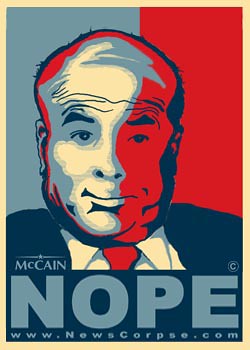In 1967, John McCain was shot out of the North Vietnamese sky, crash landed in a lake, taken prisoner, and held in captivity for … 41 years, so far.
No one can dismiss the unimaginable agony of enduring six years in an enemy prisoner of war camp. It is surely a brutal experience both physically and mentally. It is the sort of experience that never leaves you and, indeed, it seems never to have left John McCain. His entire post-POW frame of reference is shaped by what he went through, and also by what he missed as a consequence of his incarceration.
The tenor of his candidacy is quagmired in history, and that is not a reference to his age. It is his policy proposals that harken back to the past. And it is a vision of the past that is still very much alive in McCain’s mind. His arrest in Vietnam simultaneously arrested his growth as an observer of politics, foreign affairs, and diplomacy.
It’s hard to tell lately if McCain is running to succeed President Bush, Gen. Petraeus, or perhaps Gen. Westmoreland. The persistent theme that McCain has adopted with regard to Iraq is identical to the 1970’s era military establishment and Richard Nixon’s “Peace With Honor” contrivance. Nixon also promised to stay the course and bring our troops home when victory was achieved, despite overwhelming agreement, even amongst his advisers, that nothing recognizable as victory was likely to result in Vietnam.
Now, McCain accuses Obama of preferring to lose a war in order to win a political campaign. But it is McCain who is pursuing a political goal at the expense of America’s interests. McCain is crafting an election scheme that parallels Nixon’s in 1972. Win the office by assuring voters that America is always right and thus, invincible. Then worry about proving it later. Unfortunately, the post-election scenario would also mirror Nixon’s, with an eventual withdrawal from Iraq that fails to achieve any objective articulated by Bush or McCain. And like Nixon’s mis-adventures in Laos and Cambodia, McCain’s Iraq exit could include a detour through Iran. But McCain doesn’t concern himself with these realities because he is too fixated on prevailing politically. And that’s exactly what he is hypocritically accusing Obama of.
As further evidence of McCain’s confinement to the past, consider his recent advertisement titled “Summer of Love.”
It begins with images of colorful Hippies at protests, and music festivals. The announcer declares it a time of “uncertainty, hope and change,” skillfully associating uncertainty with two words that have become iconic within Barack Obama’s campaign. It then proceeds to insult an entire generation by asserting that McCain had “another kind of love – of country,” thereby implying that young Americans in the 60’s and 70’s were less than patriotic. As one of them I can assure you that it wasn’t because we hated our country that we dedicated ourselves to peace, civil rights, and free expression. Are those unpatriotic aspirations?
This is not the first time that McCain has attacked the Woodstock generation. In fact, he even opposed modest funding for a museum that commemorated the era and the event. Some may agree with McCain that…
“The Woodstock Museum is a shining example of what’s wrong with Washington on pork-barrel, out-of-control spending.”
Personally, I think that an event that drew nearly half a million people, featured some of the most popular and creative artists in the world, and emerged as emblematic of one of the most significant cultural movements of the century, deserves a small facility for remembrance and study. In addition, the Bethel Woods Arts Center, as it is called, is a working contemporary venue that enriches the community both creatively and financially.
McCain – NOPE
 The fact that McCain cannot recognize the importance of that era, and the contributions of citizens who lived through it, is representative of a larger problem for him. The time he spent in captivity was a defining time for those of us back home. There were so many socially profound events that altered just about everyone who lived through them. John McCain was not one of them. The history that shaped millions of Americans, McCain only heard about secondhand, after the fact. For example:
The fact that McCain cannot recognize the importance of that era, and the contributions of citizens who lived through it, is representative of a larger problem for him. The time he spent in captivity was a defining time for those of us back home. There were so many socially profound events that altered just about everyone who lived through them. John McCain was not one of them. The history that shaped millions of Americans, McCain only heard about secondhand, after the fact. For example:
- The first heart transplant.
- The assassinations of Martin Luther King and two Kennedys.
- Watergate and Richards Nixon’s resignation.
- The Supreme Court’s Roe v. Wade decision.
- Click here for a more comprehensive list.
So it may not be so surprising that McCain is trapped in a time warp, unable to relate to a country and world that shared these tumultuous experiences, but from which he was excluded. It may explain his hostility to a generation that was arguably more engaged in public service and community activism than any generation before or since. It puts into perspective the persistent pessimism expressed in the ad above that ends by saying to voters “Don’t hope for a better life.”
While many of us who went through the 60’s and 70’s have assimilated those experiences and included them as we’ve grown over time, McCain has remained stagnant and, in many ways, ignorant in the procession of time. That’s why, for us, the Summer of Love will always be remembered with an equal measure of frustration and pride that reflects the reality of that historic time. But McCain will only recall a combination of frightening changes and an idealized portrait of a sitcom utopia. That’s not a vision for the future that offers much hope. It’s not a vision of the future at all.


3 comments
Author
…A lifetime in captivity.
The ad and the McSame campaign both try to resurrect all of the polarities, all of the arguments that began in the mid-60’s. I thought those arguments were all conclusively ended when that helicopter took off from the roof of the US embassy in Saigon in 1975. And it’s far too late to roll that film backwards now.
Thanks for a great essay.